The 5 Best Organic Baby Formulas of 2024
Researching information on baby formula can be overwhelming! We’ve done our best to make it easy for you. Read on for our guide to the best organic baby formula, including what to look for in a formula and what to avoid, organic versus conventional formula, types of organic formula, and our recommendations for the best US and European brands of organic baby formula.
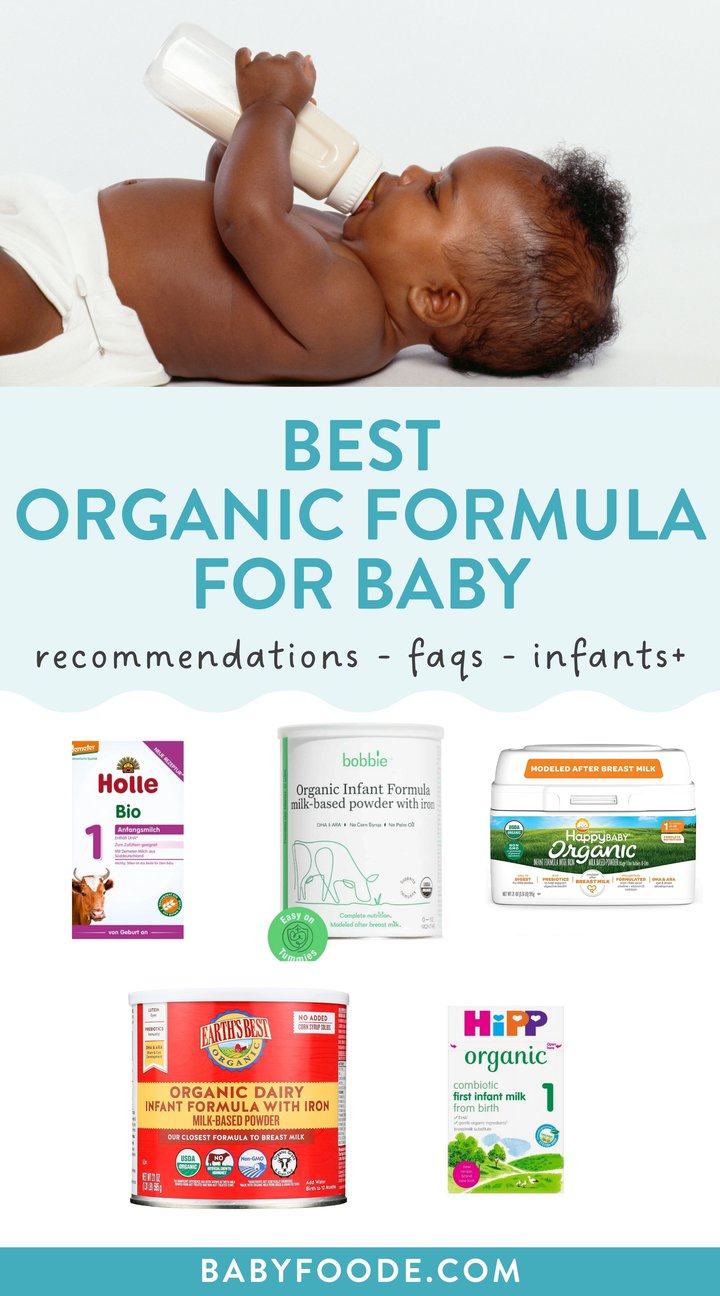
Medically reviewed and co-written by Jamie Johnson, Registered Dietitian Nutritionist (RDN), and Lauren Braaten, Pediatric Occupational Therapist (OT).
Organic Baby Formula
Deciding how and what to feed your baby are important questions all parents face. While some parents choose to breastfeed, for others this is not an option. Fortunately, there are many excellent quality, organic baby formulas to help ensure your little one is getting the best nutrition possible.
Infants can also benefit from supplementing with organic baby formula when breast milk alone isn’t enough to meet a growing baby’s nutritional requirements. Supplementing or switching to organic baby formula may be necessary if your baby isn’t gaining weight adequately, has trouble latching, or is diagnosed with jaundice. A parent’s return to work or simply a desire to no longer breastfeed may also be reasons where introducing organic baby formula is needed.
Benefits of Organic Baby Formula
Organic formula is a wonderful alternative or supplement to breast milk. In order to receive an “organic” label, companies need to comply with specific guidelines set out by the United States Department of Agriculture (USDA). This ensures organic baby formula won’t contain any synthetic ingredients and the cows will have eaten higher quality food.

Frequently Asked Questions
There is no right answer because there is no one-size-fits-all for infant baby formulas. This will depend on your baby’s needs, your preferences, and budget.
This depends on your budget and what you are comfortable with feeding your baby. Organic baby formulas will be free of synthetic pesticides, but more expensive than regular baby formula so this is a personal decision for you and your family.
Organic formula will be the same nutritionally as a comparable standard formula, however it will be free of synthetic pesticides, which may cause harmful health effects in the long term.
What to Look for in a Formula
All formulas sold in the US have to meet strict FDA guidelines and approval, are safe for your baby, and have a specific fat/carbohydrate/protein ratio and vitamin and mineral profile to meet an infant’s needs. However, there may be some specific ingredients you want to look for to support your baby’s needs (you’ll need to look at the ingredients list). The first ingredient to look for is the type of protein found in the formula (usually cow’s milk or soy) to make sure you aren’t giving your baby something he cannot tolerate. Cow’s milk protein is the first choice but if your baby cannot tolerate it, then look for a soy-based formula. Then look for the type of carbohydrate that’s predominantly found in the formula. Lactose is preferred over corn sugar/syrup, since that’s the main carb found in breast milk. After that, look for the following…
Iron
Most infant formula sold in the US is fortified with iron but to be sure, always read the label. Iron is important, especially for infants, to help prevent iron deficiency anemia, which can lead to developmental delays if left untreated. Most babies have enough iron stores from mom for the first 4 months, but after that, it’s important to give iron-fortified foods or supplements (or formula) to help prevent this deficiency.
DHA and APA
DHA (docosahexaenoic acid) and ARA (arachidonic acid) are fatty acids found in breastmilk (and fatty fish, eggs, and other foods) that may or may not be included in a formula as it’s not required to add them, but have been shown to support brain and eye development. More health benefits could less risk of skin and respiratory allergies and illnesses.
Probiotics and Prebiotics
These aren’t required to be included in formulas either but breast milk also contains these so many companies include them to try to get formula closer to the gold standard of breast milk. Including them may help infants’ GI tract resemble those breastfed babies. According to the American Academy of Pediatrics, probiotics, or good bacteria, in infant formula can help promote a balance of bacteria by offsetting the growth of bad bacteria which can cause infections and inflammation. Formula supplemented with probiotics may help prevent and treat infectious diarrhea and eczema and reduce the risk of food allergies, asthma, UTI’s, and colic symptoms.
Babies fed formula supplemented with prebiotics, or the food probiotics feed on, tend to have better stool consistency and frequency and have a higher concentration of the good bacteria bifidobacteria in their intestines compared to those fed standard formula. Prebiotics added to formula may also help support the immune system and lessen the risk for infection and allergies.
What you Want to Avoid in a Formula
All infant formulas sold in the U.S. are safe for consumption but each baby is different in how they may tolerate different formulas. Most babies will do fine with a standard cow’s milk protein formula, but if not, it can be hard to determine which specific ingredient baby is having a hard time with. Sometimes it takes switching formulas a few times to find one that baby is happy with.
Here are a few things to consider:
Allergens/Intolerances
The main thing you want to avoid is anything that your baby has an intolerance or allergy to. Most healthy babies are fine to have cow’s milk protein (which is recommended above soy), however, if they have an adverse reaction to it, or you are a vegan family, you obviously want to avoid this and choose a soy-based formula instead.
Sugars
Ideally, the main carbohydrate/sugar you want in your baby’s formula is lactose, instead of corn syrup, corn syrup solids, corn maltodextrin, glucose syrup, brown rice syrup, or sucrose. The vast majority of babies tolerate lactose just fine and lactose helps your baby absorb calcium in the formula and feeds gut bacteria in your baby’s gut. However, if your baby is on a U.S. soy-based formula, it will be lactose-free.
Palm Oil
This one is a little controversial, as it’s found in so many infant formulas, because it provides palmitic acid, a fatty acid found in breast milk. However, it is not digested the same as the palmitic acid found in breast milk. In some babies, it can cause G.I. upset and cause them to absorb less calcium and fat. It is also a major contributor to deforestation in the world, so if that’s important to you, you may want to avoid fat blends where palm oil is listed as the main ingredient, or avoid it altogether.
Baby Formula Stages
Some formulas come in different stages to model the changing composition of breast milk as your baby gets older. They are usually listed as stage 1 for 0-6 months of age and stage 2 for 6-12 months of age; however, feeding different stages isn’t required. In European formulas, these stages are required and regulated, however this is not the case in U.S. formulas.
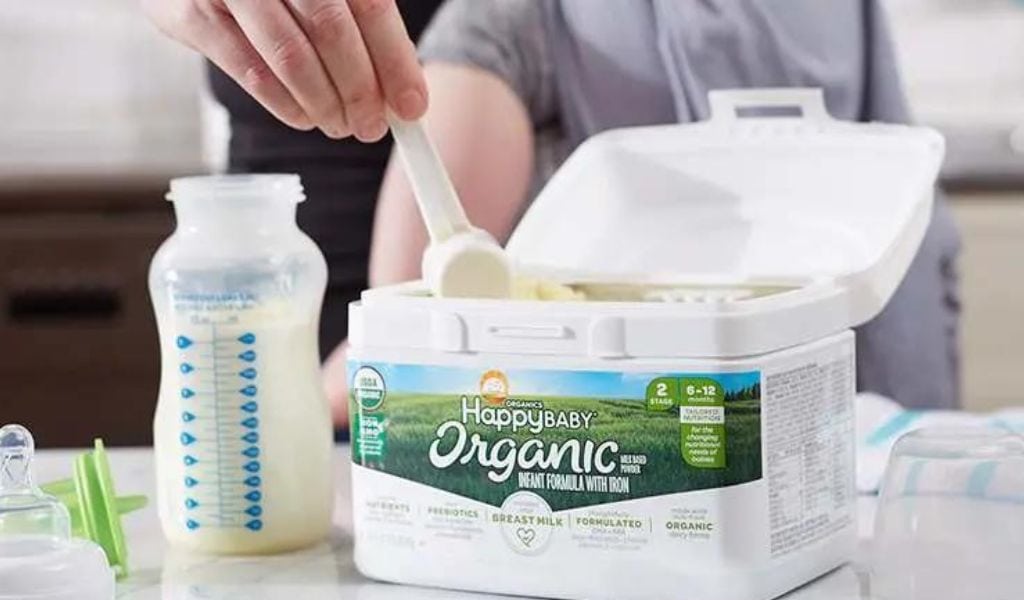
Organic vs. Conventional Baby Formula
Organic formula does not necessarily mean healthier formula (or any food for that matter). A formula can still have unwanted ingredients, though organic, and yet still not be recommended ingredients for your baby. Organic sugar and fillers are still sugar and fillers. The type of protein, carbs and fat, etc. are more important than whether these ingredients are organic or not. However, if you can find a formula that meets your baby’s needs and your preferences when it comes to protein, fat, carbs, iron, DHA, etc, AND it’s organic, then by all means, buy the organic one if it fits in your budget.
Organic formula will be free from synthetic pesticides, synthetic hormones and antibiotics which may have long-term health effects.
Types of Organic Formula
Cow’s Milk Formula
This is what is recommended as the first choice for most babies. A majority of babies will be fine with these formulas and tolerate them well. The proteins in cow’s milk formula are whey and protein, which are actually both found in breastmilk, too, just in different ratios. If you want formula to more resemble breast milk, you may want to choose a formula that has additional whey added.
Goat’s Milk Formula
Goat’s milk actually has the same proteins, whey and casein, as cow’s milk, so if your baby has been diagnosed with a cow’s milk protein allergy, he will not be able to tolerate goat’s milk formula either. However, if your baby just has a sensitivity to cow’s milk, goat’s milk may help, because it is digested more quickly and completely than cow’s milk. This could result in less gas, cramping, and constipation, and therefore discomfort, for your baby.
Unfortunately, there are no U.S. infant goat’s milk formulas on the market yet so you’ll have to get a European brand.
Soy Based Formula
This is the alternative if your baby has galactosemia, is truly lactose intolerant, or if your family is vegan and does not consume milk products. U.S. soy-based products are lactose-free (which means the carbohydrates are likely coming from corn syrup); however European soy-based formulas have a minimum of 30% lactose as the carbohydrate.
Hypoallergenic Baby Formula
Cow, goat and soy proteins are larger than proteins found in breastmilk and therefore harder for your baby to digest. They’re also more allergenic. Formulas that are hypoallergenic have had these proteins broken down or predigested to create less of an immune response, and to help ease digestion for your baby. These formulas are labeled as partially hydrolyzed, extensively hydrolyzed and free amino acid-based, depending on how much the proteins have been broken down. They are usually recommended for babies who are at risk for food allergies or certain immune diseases.
Free amino acid formulas are meant for babies who have severe digestion problems and cannot digest protein and should only be given under the supervision of their pediatrician. As always, consult your pediatrician when choosing any formula.
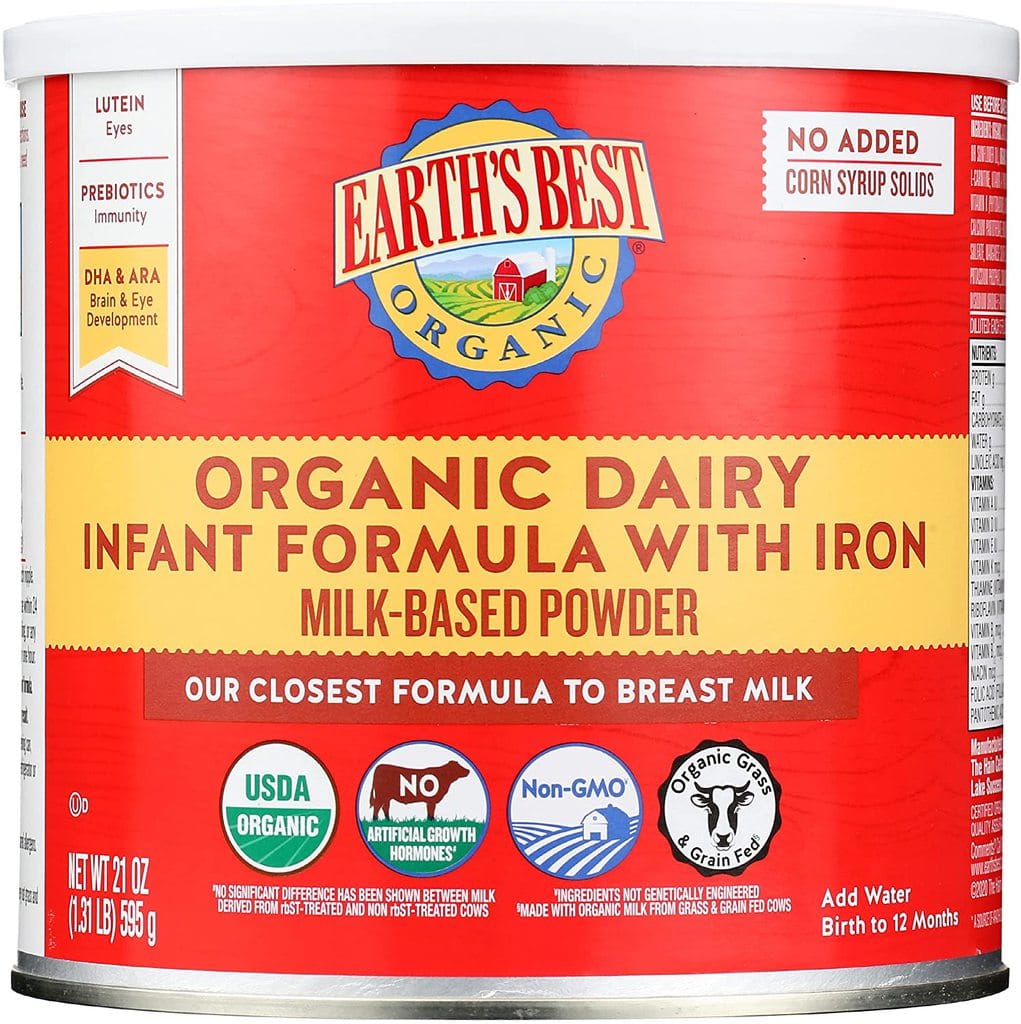
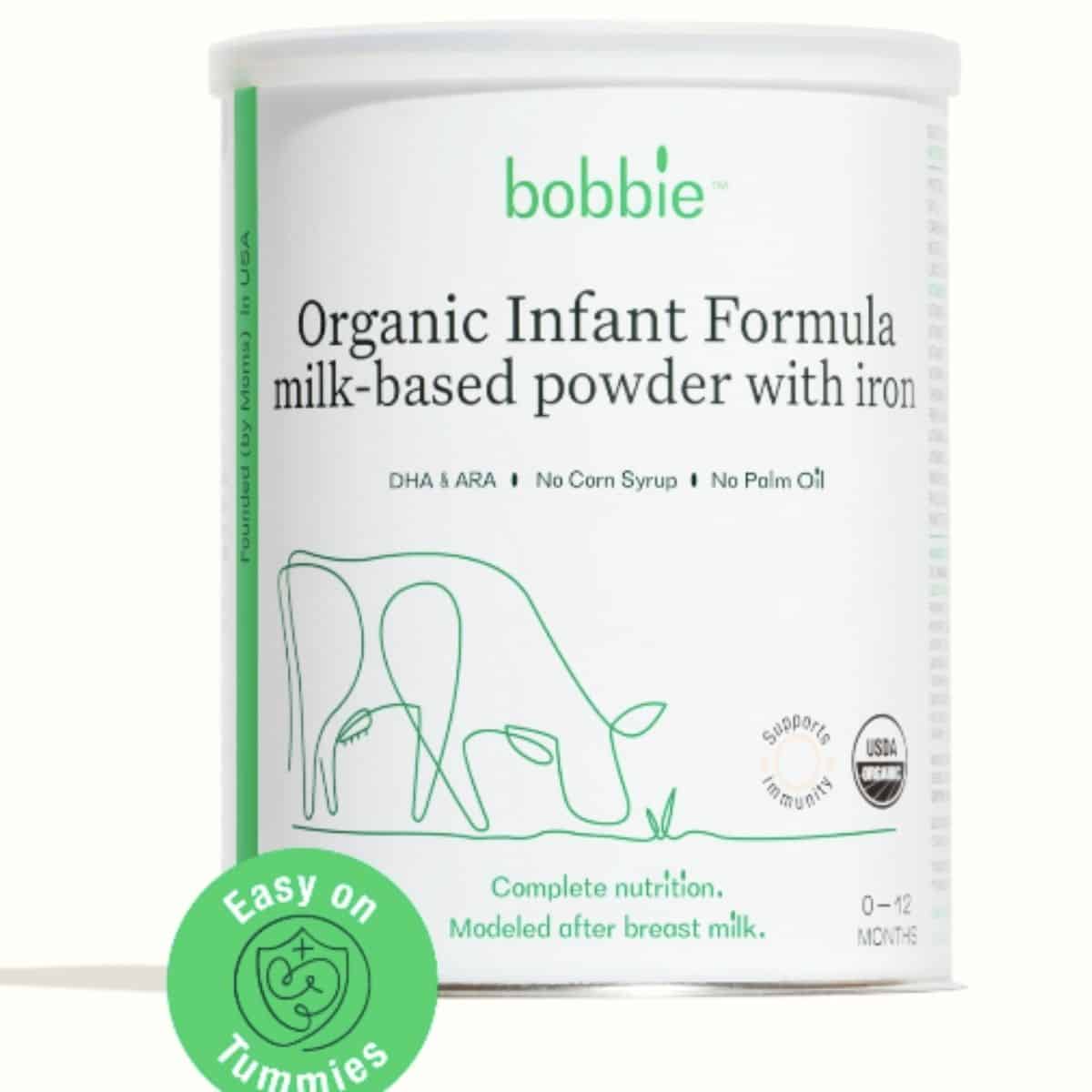
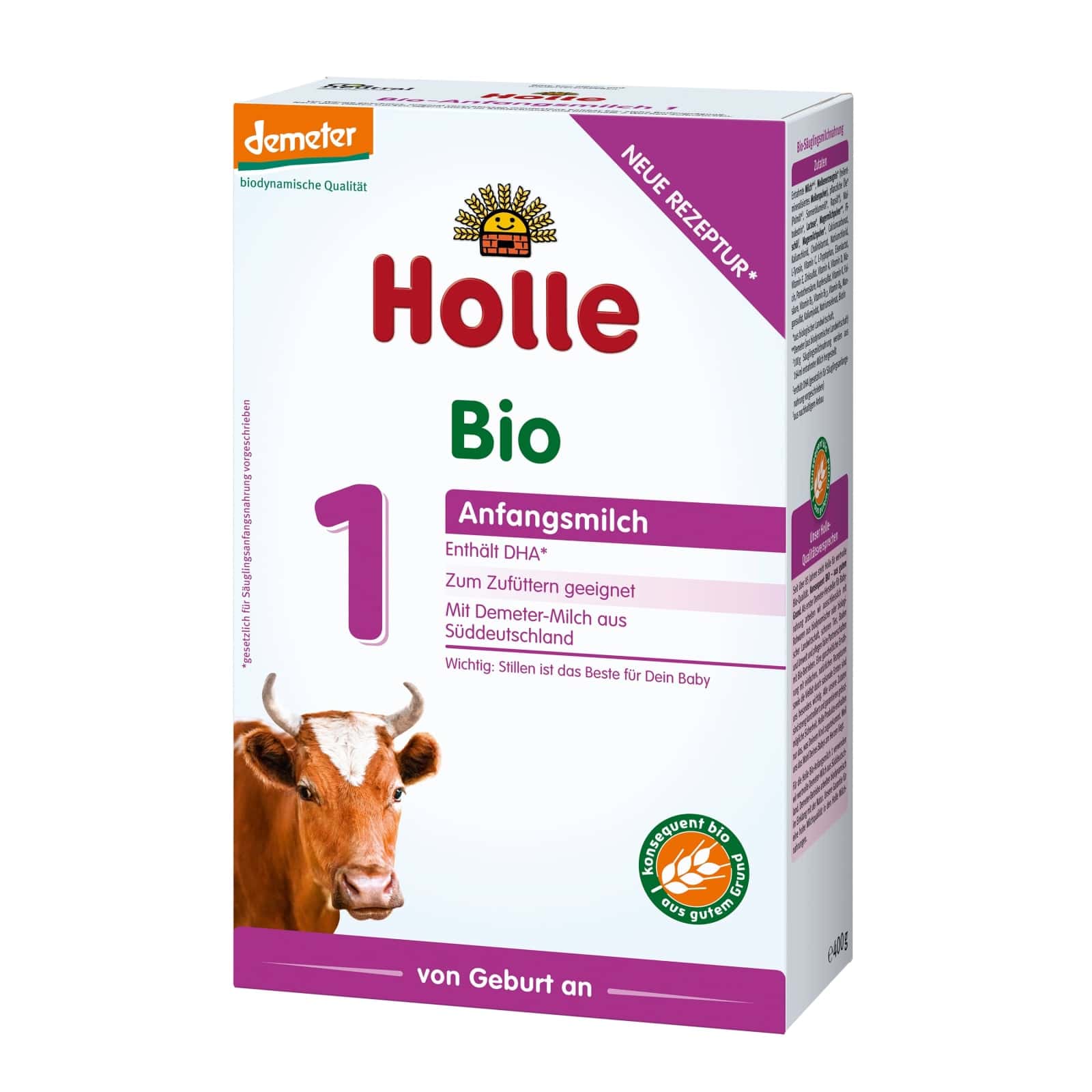
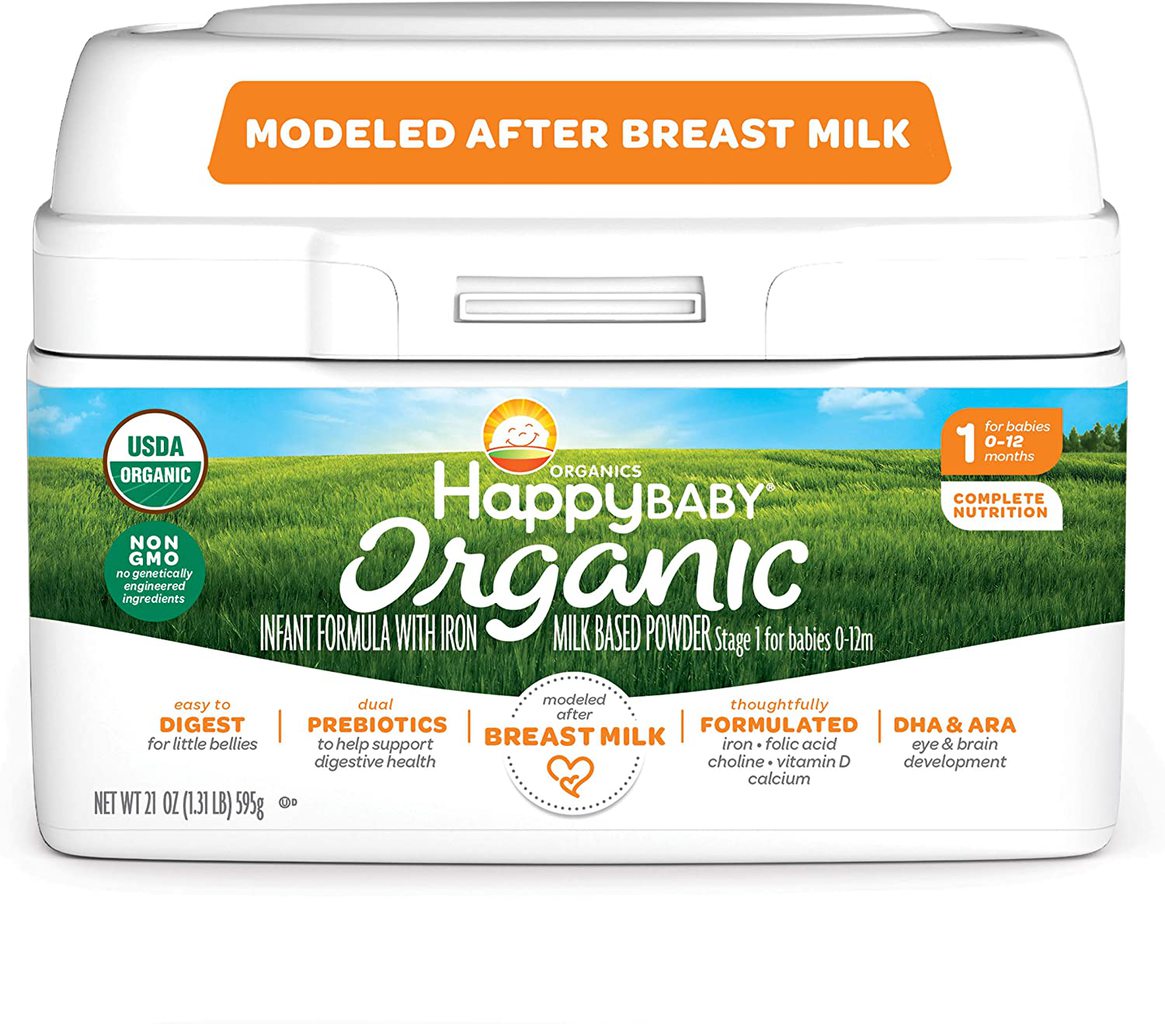
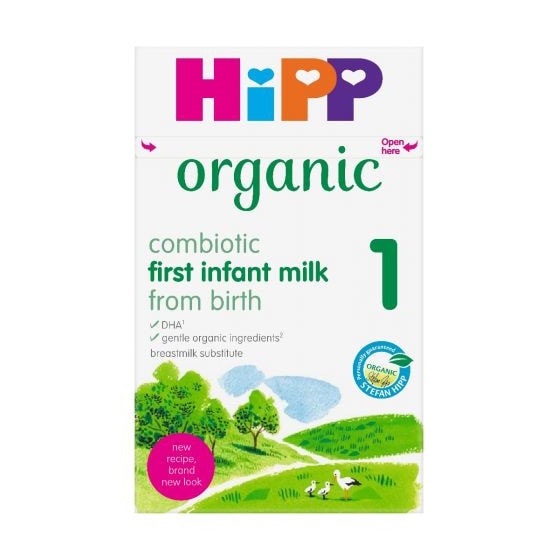
Our Top Picks
- Best Overall: Happy Baby Organics Infant Formula – $30.97 at Amazon
- Best for Breastfed Babies: Bobbie Organic Infant Formula – $104 for 4 cans at Bobbie
- Best Sensitive Formula: Earth’s Best Organic Sensitivity Baby Formula – $28.49 at Amazon
- Best European Baby Formula: Holle Baby Formula – $22.99 at Organic Baby Food Shop
- Another Good European Option: Hipp Formula – $35.99 at Organic Baby Food Shop
US vs. European Formula Brands
All formulas sold in the US have undergone strict regulation by the FDA and meet the minimally required standards for formulas to meet infants’ needs. European formulas bypass safety regulations set forth by the FDA which can increase their risk of contamination. This is not to say European formulas are not safe, they just have a different set of regulations in Europe. And when they are imported illegally, there’s a higher risk of being tampered with, so if you choose to buy a European formula, make sure you are using a trusted 3rd party seller.
Also, keep in mind not all versions of the formula are the same. Brands have manufacturers in different countries so they may have different ingredients than what you are expecting, depending on what country your specific box of formula is coming from, and the label may be in a different language. Make sure your supplier can tell you what is in the formula you are buying if you cannot read the label and what manufacturer or version you are buying.
Make sure your supplier has an established supply chain and will not have an unexpected shortage once you place your order. Ideally, they will maintain a local U.S. inventory so the shipping estimate is accurate. I’d also confirm that they only use air freight only since it’s quicker than a boat to reduce the chance that the product has been exposed to high heat and is not expired.
Here are some major key differences in US and European formulas…
Farming practices
In Europe, all infant formulas are required to be completely free of all pesticides, which is essenially organic. In the US, synthetic pesticides can be used, or crops may have been contaminated by neighboring farms that are not organic and subsequently have traces of pesticides on them. In Europe, standards are stricter and most formulas come from grass-fed, sustainable farms.
Staging System
European formulas follow a staging system that is regulated and these stages have different nutrients in them based on the needs of the child. In the U.S., these stages are not required or regulated.
Iron
European formula does not have as much iron included as U.S. formulas do. Their requirement is about as half as much as what the U.S. requires.
Carbohydrates/Sugar
The U.S. does not have requirements on the type of carbohydrate found in formulas- it can be anything from lactose to sucrose to corn syrup. European formulas do not allow any sucrose in their formulas, and have a minimum requirement of 30% lactose, even in soy formulas.
Additives
European standards are more conservative when it comes to additives- they do not contain any gums or carrageenan.
Reviews of the Best Organic Baby Formulas
1. Best Overall: Happy Baby Organics Infant Formula

Happy Baby Organics has 4 times more prebiotics than most other organic milk-based formulas, including fibers that mimic the function of the prebiotics found naturally in breast milk. Made with milk from organic dairy farms, it’s formulated with DHA, ARA, iron, folic acid, choline, vitamin D and calcium. Plus, it contains lactose, which is also present in breastmilk.
Formula Options:
- Organic Infant Formula, Stage 1 (0-12 months)
- Organic Infant Formula, Stage 1 Sensitive (0-12 months)
- Organic Infant Formula, Stage 2 (6-12 months)
Pros:
- No corn syrup solids
- No carrageenan
Cons:
- Tends to produce foam when mixing
What Others Are Saying:
The Bump named Happy Baby Organics the best organic formula overall, What to Expect awarded it the best formula with prebiotics, and it has a 4.7-star rating on Amazon with more than 2,900 reviews.
2. Best for Breastfed Babies: Bobbie Organic Infant Formula

Bobbie Organic Infant Formula uses a European-style formulation with quality organic ingredients and nutritional composition. The company’s website has incredibly helpful feeding charts and offers a monthly subscription service, which can help save money. Bobbie formula contains no sucrose or glucose syrup solids, it’s gluten-free, and it’s made with lactose, DHA, and both Omega-3 and Omega-6. The biggest downside to Bobbie is that it doesn’t contain any prebiotics, which is why we recommend it for breastfed babies, since they’re getting those important prebiotics via Mom.
Formula Options:
Pros:
- Excellent quality
- No clumping
Cons:
- Doesn’t contain prebiotics
- Expensive
What Others are Saying:
Good Housekeeping named Bobbie the best overall and What to Expect calls Bobbie the best European formula alternative.
3. Best Sensitive Formula: Earth’s Best Organic Sensitivity
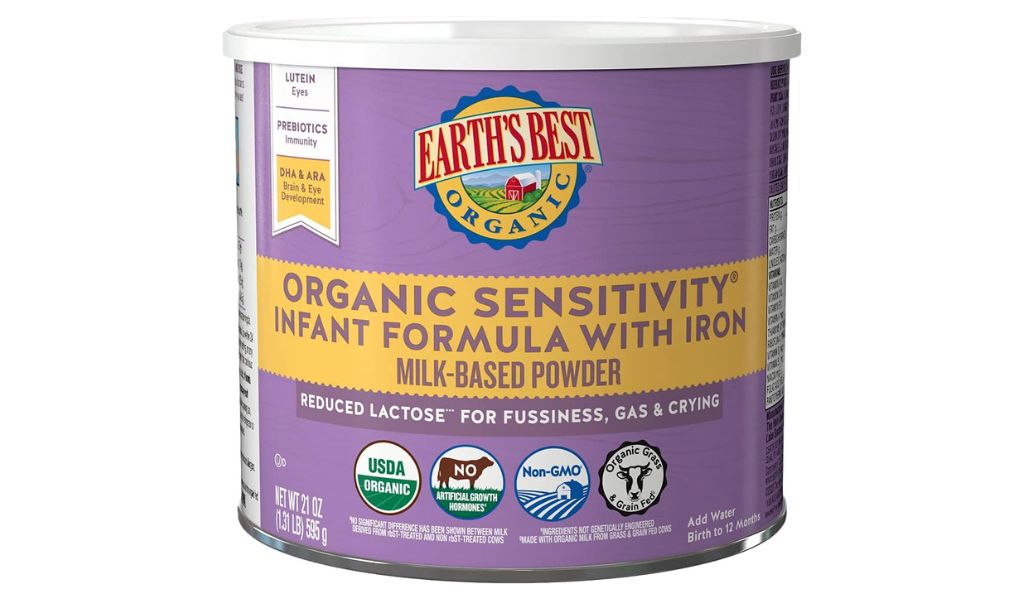
Designed especially for babies with fussiness or gas, Earth’s Best Organic Sensitivity contains 95% less lactose than other milk-based infant formulas. This means that it’s easier to digest for babies with sensitive tummies. We love that Earth’s Best Organic Sensitivity is fortified with iron for red blood cell development and contains DHA and ARA, two fatty acids found in breast milk that help support brain and eye health.
Formula Options:
Pros:
- No added corn syrup solids
- Reduce lactose formula
Cons:
- Contains palm oil
- Strong odor
What Others are Saying:
Healthline picked Earth’s Best Organic Sensitivity as the best organic formula, and it has a 4.7-star rating from over 2,400 reviews on Amazon.
4. Best European Baby Formula: Holle

Holle is an established German company known for producing high-quality, organic powdered formulas while also using sustainable farming and manufacturing processes. All of Holle’s baby formulas are free of sucrose and corn syrups, and they contain Omega-3 and Omega-6 fatty acids, ingredients that are vital for a baby’s growth and development. Because it comes from overseas, it can be a bit tricky to get your hands on, but I’ve found it at some organic food stores.
Formula Options:
Pros:
- Added DHA
- All natural ingredients
Cons:
- Some stages contain Maltodexterin
- Contains palm oil
5. Another Great European Option: HiPP Organic

HiPP is a family-owned company that has been producing baby food for over 50 years. We love this formula’s excellent macronutrient and micronutrient contents, including the addition of Omega-3 and Omega-6 fatty acids as well as pre and probiotics. Made with high-quality milk from free-range cows, all of HiPP’s formulas are 100% organic and are gluten- and soy-free. Like other UK formulas, this can only be found at some organic food stores.
Formula Options:
Pros:
- gentle on sensitive tummies
- no maltodextrin, starch, sucrose or corn syrups
Cons:
- Contains palm oil
Other Organic Baby Formulas We Considered
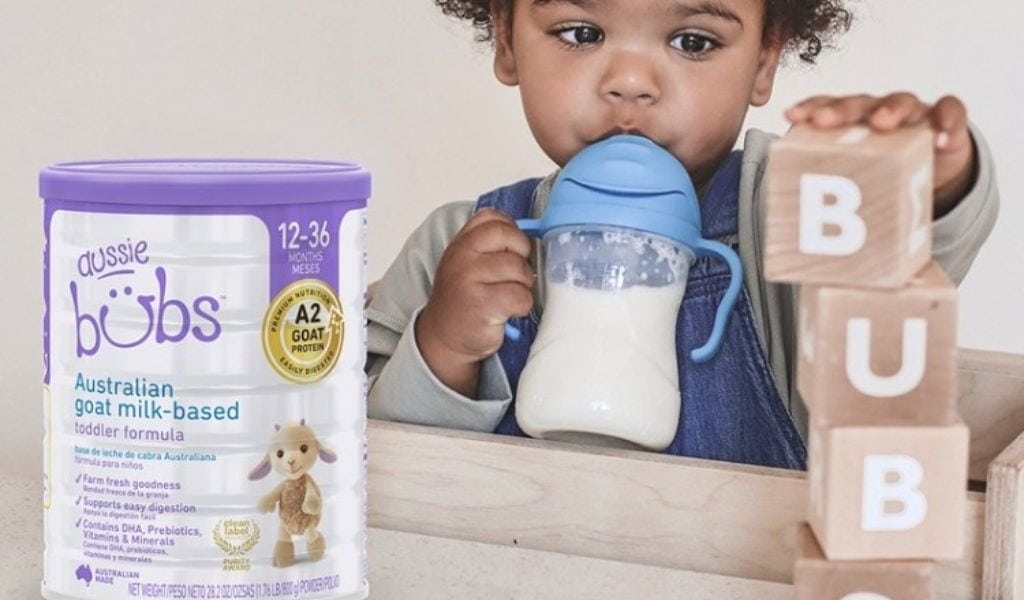
Bellamy’s Organic
Bellamy’s is an Australian infant formula brand that’s now widely available in the United States. It has no added sucrose or GMO ingredients, and it contains both DHA and ARA omegas derived from fish. Bellamy’s Organic is available at Amazon for $30.62.
Bub’s Organic Grass Fed Infant Formula
Bub’s is another Aussie brand that offers both cow and goat milk based baby formulas. We like that it’s made with milk from grass-fed cows, and that it’s free of GMO ingredients. Bub’s Organic Grass Fed Infant Formula is available at Amazon for $39.39.
Baby’s Only
The first organic baby formula in the U.S. (it was founded in 1999!), Baby’s Only contains no corn syrup or palm oil, and it’s gluten free. The only drawback? Some parents find that it’s hard for their baby to digest and causes constipation. Baby’s Only is available at Target for $27.99.
Why You Can Trust Me
I’m Michele Olivier, the creator of the Baby FoodE blog, where I post adventurous recipes ranging from babies’ first purees to equally memorable (but perhaps less enjoyable) sit-down family dinners with feisty toddlers. I began my baby blog shortly after I had my first baby girl, Elliette.
As a mom of two, I’ve “been there, done that,” meaning I know how much of a struggle it can be to feed babies. Whether you’re just looking to supplement your breastmilk with a few ounces of formula, or if you’ve transitioned to 100% formula feeding, I put together this guide to organic baby formula to help you make the best choice for you and your baby. Most of the formulas on this list are brands that I’ve personally used, and all of them have received high praise from other parents. These products were also medically reviewed by Jamie Johnson, Registered Dietitian Nutritionist (RDN), and Lauren Braaten, Pediatric Occupational Therapist (OT).

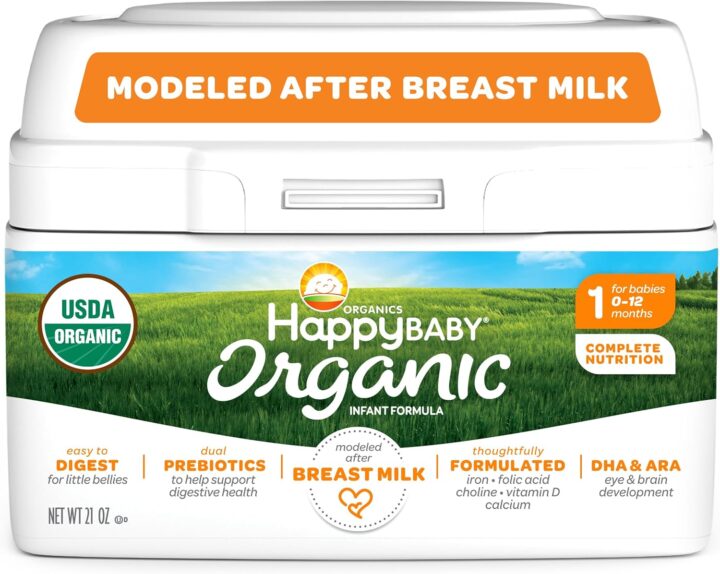

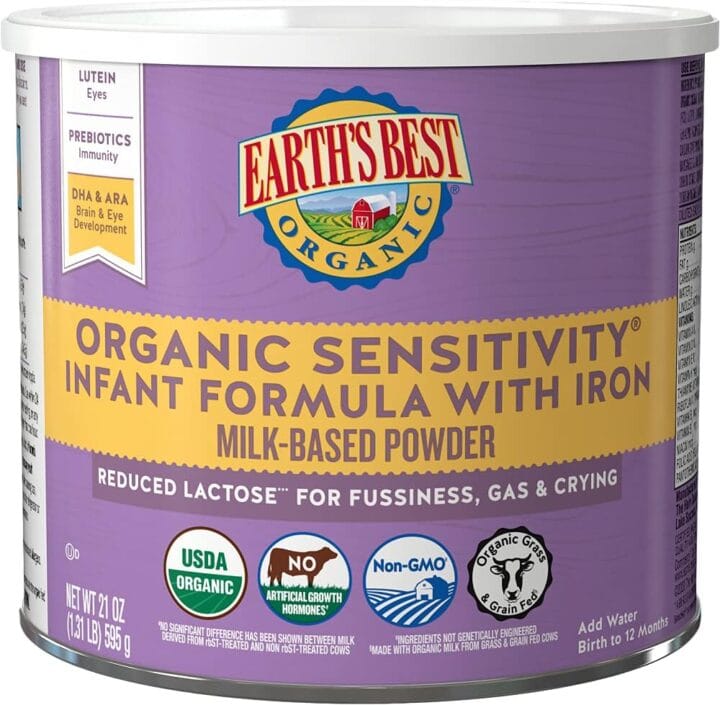


87 Comments on “The 5 Best Organic Baby Formulas of 2024”
What about HiPP Organic that can be purchased from Europe? Where does it fall in this table you have created? I’m looking at the ingredient list and I think it ranks far above any of the products you have listed. I’m interested in your thoughts.
http://www.hipp.co.uk/products/our-baby-milks/infant-milk/first-infant-milk
Still working on researching this product…
What about HiPP Organic that can be purchased from Europe? Where does it fall in this table you have created? I’m looking at the ingredient list and I think it ranks far above any of the products you have listed. I’m interested in your thoughts.
http://www.hipp.co.uk/products/our-baby-milks/infant-milk/first-infant-milk
Still working on researching this product…
HI Michele,
I am in the process of weaning my son (6 1/2 months) and have eagerly began making your purees and blends. Thanks for all the information and recipes!
I am also struggling with formula. What organic did you go with? Have you heard anything about the Duke University research study that found arsenic in Baby’s Only Organic? If yes, any thoughts on that? I was going to go with them until I read that and now I am torn. I think organic is the way to go but now I am confused. Any guidance?
Thanks!
Colleen Pragalz
Hello Colleen,
So glad your little one is liking the purees and blends!!! yay!!!
As far as formulas go – I went with Baby’s Only Organic for my first one and will at some point will probably use it for my second one. Out of all the formulas I researched this one felt like the best fit for my family. It is hard because it almost feels like you are picking the lesser of two evils when you compare baby formulas. And after the study come out from Duke, Baby Only changed their formula to have no trace of arsenic in it.
I am still doing research on HIPP formula brand that comes out of Europe (it’s been a slow process as the little ones seems to suck all my brain power out of me each day:) and this might be another great option except that they do not directly sell to the US. You can still get it you just have to do a little digging around the net to find it. If anyone has a good source, I would love to know.
But yes, I would absolutely go with an organic formula and any that I mentioned above are good brands to consider.
Hope that helps. If not, let me know:)
xoxo,
Michele
HI Michele,
I am in the process of weaning my son (6 1/2 months) and have eagerly began making your purees and blends. Thanks for all the information and recipes!
I am also struggling with formula. What organic did you go with? Have you heard anything about the Duke University research study that found arsenic in Baby’s Only Organic? If yes, any thoughts on that? I was going to go with them until I read that and now I am torn. I think organic is the way to go but now I am confused. Any guidance?
Thanks!
Colleen Pragalz
Hello Colleen,
So glad your little one is liking the purees and blends!!! yay!!!
As far as formulas go – I went with Baby’s Only Organic for my first one and will at some point will probably use it for my second one. Out of all the formulas I researched this one felt like the best fit for my family. It is hard because it almost feels like you are picking the lesser of two evils when you compare baby formulas. And after the study come out from Duke, Baby Only changed their formula to have no trace of arsenic in it.
I am still doing research on HIPP formula brand that comes out of Europe (it’s been a slow process as the little ones seems to suck all my brain power out of me each day:) and this might be another great option except that they do not directly sell to the US. You can still get it you just have to do a little digging around the net to find it. If anyone has a good source, I would love to know.
But yes, I would absolutely go with an organic formula and any that I mentioned above are good brands to consider.
Hope that helps. If not, let me know:)
xoxo,
Michele
Hi. Glad to have stumbled on your post as I have been breastfeeding my 6 month old but have been forced to supplement with formula due to my body’s dislike of pumping 🙁 I have been using the HiPP formula and I am very happy with it, but to be honest the stress of trying to find it and have it get here in a timely manner is driving me CRAZY. I’ve already been stressed enough about my decreased milk supply. I am thinking that switching to Baby’s Only is now the way to go as it seems to be the "best of the worst" in the US and is readily available. My biggest concern is that I’ve read a lot of reviews that say it gave their baby constipation. Have you had any issues with this or heard anything more on this? Also, do you use give your baby an alternate DHA/RHA supplement? I’m wondering if continuing to breastfeed at night and providing what little milk I do pump will provide enough of this? Any words of advice that you have will be greatly appreciated. Thank you!
Hello Stephanie,
My wee one did get a little constipated when I first introduced her to the formula, which is perfectly normal. Anytime you introduce formula or food for the first time your little one will probably get a little backed up while their system is trying to process all the new ingredients you are giving them. If you have started purees, then I would recommend loading up on any foods that starts with a P – prunes, pears, peaches, plums, etc as they help with constipation. If they are only on formula, then I would do a couple oz of water to see that helps. If it continues then you should consult your doctor.
I only gave my girl a supplement of fish oil after she was weaned from my breast milk. I didn’t want to overdo it with the supplements and figured at least she was going to get some of it through my breast milk since I take probiotics and fish oil everyday.
Hope that helps.
xoxo,
Michele
Hi. Glad to have stumbled on your post as I have been breastfeeding my 6 month old but have been forced to supplement with formula due to my body’s dislike of pumping 🙁 I have been using the HiPP formula and I am very happy with it, but to be honest the stress of trying to find it and have it get here in a timely manner is driving me CRAZY. I’ve already been stressed enough about my decreased milk supply. I am thinking that switching to Baby’s Only is now the way to go as it seems to be the "best of the worst" in the US and is readily available. My biggest concern is that I’ve read a lot of reviews that say it gave their baby constipation. Have you had any issues with this or heard anything more on this? Also, do you use give your baby an alternate DHA/RHA supplement? I’m wondering if continuing to breastfeed at night and providing what little milk I do pump will provide enough of this? Any words of advice that you have will be greatly appreciated. Thank you!
Hello Stephanie,
My wee one did get a little constipated when I first introduced her to the formula, which is perfectly normal. Anytime you introduce formula or food for the first time your little one will probably get a little backed up while their system is trying to process all the new ingredients you are giving them. If you have started purees, then I would recommend loading up on any foods that starts with a P – prunes, pears, peaches, plums, etc as they help with constipation. If they are only on formula, then I would do a couple oz of water to see that helps. If it continues then you should consult your doctor.
I only gave my girl a supplement of fish oil after she was weaned from my breast milk. I didn’t want to overdo it with the supplements and figured at least she was going to get some of it through my breast milk since I take probiotics and fish oil everyday.
Hope that helps.
xoxo,
Michele
Have you been able to research any more info about HiPP formula?
sorry, I have been slacking. Will get back on it after the holiday. Promise!
Have you been able to research any more info about HiPP formula?
sorry, I have been slacking. Will get back on it after the holiday. Promise!
Thank you for this!
Thank you for this!
Hi Michele,
For the Baby’s Only formula, they have one with DHA & ARA, would you recommend that? Or just the regular formula?
Hello Katie,
I would get the Baby’s Only regular formula and then add a dose of fish oil formulated for your baby. You can add this once a day to their bottle. I feel like this is a purer form of DHA and not refined in anyway. Not to mention the formula with the DHA and ARA is an extra $5!! There are several amazing brands that make fish oil for babies and can be found at most health food stores. I have personally used Nordic Naturals and both my toddler and baby gobble it up.
Hope that helps!
Michele
Hi Michele,
For the Baby’s Only formula, they have one with DHA & ARA, would you recommend that? Or just the regular formula?
Hello Katie,
I would get the Baby’s Only regular formula and then add a dose of fish oil formulated for your baby. You can add this once a day to their bottle. I feel like this is a purer form of DHA and not refined in anyway. Not to mention the formula with the DHA and ARA is an extra $5!! There are several amazing brands that make fish oil for babies and can be found at most health food stores. I have personally used Nordic Naturals and both my toddler and baby gobble it up.
Hope that helps!
Michele
You gave a great formula charge – thanks. But According to the Manufacturer of Baby’s Best Formula "Nature’s One believes breast milk is the baby’s best organic option. Baby’s Only Organic is intended for a toddler 1-year of age and older or as directed by a healthcare professional." So what can you use as a supplement with breastfeeding from birth to 1 year if needed?
Hello Carol,
For the research I have done, they label their products with this because they completely promote breast feeding.
Here is what their websites says –
Nature’s One® promotes breast feeding as the best source of nutrition for developing babies and toddlers. Our formulas are nutritionally complete to supplement or replace breast milk when necessary.
We are sensitive to the fact that breast milk is not always available to mothers with physical limitations and adopting parents.
Hope that helps!
xoxo,Michele
You gave a great formula charge – thanks. But According to the Manufacturer of Baby’s Best Formula "Nature’s One believes breast milk is the baby’s best organic option. Baby’s Only Organic is intended for a toddler 1-year of age and older or as directed by a healthcare professional." So what can you use as a supplement with breastfeeding from birth to 1 year if needed?
Hello Carol,
For the research I have done, they label their products with this because they completely promote breast feeding.
Here is what their websites says –
Nature’s One® promotes breast feeding as the best source of nutrition for developing babies and toddlers. Our formulas are nutritionally complete to supplement or replace breast milk when necessary.
We are sensitive to the fact that breast milk is not always available to mothers with physical limitations and adopting parents.
Hope that helps!
xoxo,Michele
Problem with "Baby’s Only Organic Formula – The manufacturer states it is only for 1 year old and above: "Nature’s One believes breast milk is the baby’s best organic option. Baby’s Only Organic is intended for a toddler 1-year of age and older or as directed by a healthcare professional."
Problem with "Baby’s Only Organic Formula – The manufacturer states it is only for 1 year old and above: "Nature’s One believes breast milk is the baby’s best organic option. Baby’s Only Organic is intended for a toddler 1-year of age and older or as directed by a healthcare professional."
Any updates on the HiPP organic formula?
Any updates on the HiPP organic formula?
I use Holle, which is supposedly slightly better than Hipp. There’s a site based in NY which sells Holle, but unfortunately not Hipp. Perhaps you can ask them. Biobaby24
Thanks for the info! I still need to add these brands… once I get a full nights sleep:)
I use Holle, which is supposedly slightly better than Hipp. There’s a site based in NY which sells Holle, but unfortunately not Hipp. Perhaps you can ask them. Biobaby24
Thanks for the info! I still need to add these brands… once I get a full nights sleep:)
Have you ever researched Babynat? I went with that over Hipp (I’m based in London) when I started to try combination feeding with my son. There’s no palm oil, which is why I chose it. I also tried Nanny Care, which is goats milk based.
Hello Noora,
I haven’t heard of either of these brands but will look into them. Now that baby P is sleeping through the night (most of the time) I have a little more brain power to do some research:)
xo, Michele
Have you ever researched Babynat? I went with that over Hipp (I’m based in London) when I started to try combination feeding with my son. There’s no palm oil, which is why I chose it. I also tried Nanny Care, which is goats milk based.
Hello Noora,
I haven’t heard of either of these brands but will look into them. Now that baby P is sleeping through the night (most of the time) I have a little more brain power to do some research:)
xo, Michele
Have you looked into Honest brand formula?
I just found that Honest brand makes a formula! I will look into it!
xo, Michele
Have you looked into Honest brand formula?
I just found that Honest brand makes a formula! I will look into it!
xo, Michele
So thankful to have found this post! Our little one just hit six weeks and we were having the same problem with lengthy nursing sessions and constantly eating at night and not sleeping until 4am when she wore herself out. Everyone kept saying it was a growth spurt so I kept at it until I noticed he stools changing colors from mustard to brownish green. I read this can mean she wasn’t getting enough so I have been exclusively pumping and her stools turned back to mustard color, but I anticipate I am not going to be able to keep up with how much she’s eating here soon so I am thankful to have found this post. Going to keep on my favorites tab for when we have to start supplementing. Thank you!!
Hello Cydnee,
Great job working so hard at breastfeeding! It really is hard for some of us moms! I had to supplement with both of my girls and while it was so hard for me to give them formula, it was also hard on me pumping 4 or 5 times a day in addition to nursing, constantly worrying and doing the math to see if I would have enough milk for the day and constantly taking supplements to try to boost my supply, all of this when I should have been sleeping or enjoying my new baby. Stay strong and do whatever is right for you.
Hugs, Michele
So thankful to have found this post! Our little one just hit six weeks and we were having the same problem with lengthy nursing sessions and constantly eating at night and not sleeping until 4am when she wore herself out. Everyone kept saying it was a growth spurt so I kept at it until I noticed he stools changing colors from mustard to brownish green. I read this can mean she wasn’t getting enough so I have been exclusively pumping and her stools turned back to mustard color, but I anticipate I am not going to be able to keep up with how much she’s eating here soon so I am thankful to have found this post. Going to keep on my favorites tab for when we have to start supplementing. Thank you!!
Hello Cydnee,
Great job working so hard at breastfeeding! It really is hard for some of us moms! I had to supplement with both of my girls and while it was so hard for me to give them formula, it was also hard on me pumping 4 or 5 times a day in addition to nursing, constantly worrying and doing the math to see if I would have enough milk for the day and constantly taking supplements to try to boost my supply, all of this when I should have been sleeping or enjoying my new baby. Stay strong and do whatever is right for you.
Hugs, Michele
great article. although, i’m cautious with home-made formulas. although it’s good to know what’s in it, you should have the know-how too. and most mother’s don’t have it. also, i would like to add 2 additional organic formulas too your list, which have been recommended by my pediatrician. the formulas are HIPP and Holle. 2 European vendors of organic formulas. i buy them on <a href="https://myorganicformula.com/">http://myorganicformula.com/</a>
Thank you for your input. I was going to add those two brands in but when I was shopping for a formula for Parker, getting those two brands was totally hit or miss. Have you found a good source for them?
great article. although, i’m cautious with home-made formulas. although it’s good to know what’s in it, you should have the know-how too. and most mother’s don’t have it. also, i would like to add 2 additional organic formulas too your list, which have been recommended by my pediatrician. the formulas are HIPP and Holle. 2 European vendors of organic formulas. i buy them on <a href="https://myorganicformula.com/">http://myorganicformula.com/</a>
Thank you for your input. I was going to add those two brands in but when I was shopping for a formula for Parker, getting those two brands was totally hit or miss. Have you found a good source for them?
Also check http://formulareviews.com/earths-best-organic-infant-formula-with-iron-23-2-ounce/ as well.
Also check http://formulareviews.com/earths-best-organic-infant-formula-with-iron-23-2-ounce/ as well.
Hollie changed our daughter’s life literally. I highly recommend this for your child. It is simply the best. We buy from https://myorganicformula.com/. A million times better than anything you can compare with any other organic formula for your baby.
Thank you for your review on this! I am so happy to see that it is easier to find in the states now. When I was using formula is was so expensive to ship it here and most sites were always backordered.
xo, Michele
Hollie changed our daughter’s life literally. I highly recommend this for your child. It is simply the best. We buy from https://myorganicformula.com/. A million times better than anything you can compare with any other organic formula for your baby.
Thank you for your review on this! I am so happy to see that it is easier to find in the states now. When I was using formula is was so expensive to ship it here and most sites were always backordered.
xo, Michele
When I got pregnant only 5 months after giving birth to my middle child (whoops) my supply took a nose dive and eventually dried up. It was no longer a choice, I needed to put her on some sort of formula. I stood in the Isle a target reading and re-reading labeles. I finally settled on the lesser of the evils available to me, went to the car and bawled all the way home. Got home made a bottle and she was finally content and full. Then I set myself to doing some research and I finally found Baby’s only. What a relief! An affordable organic option! She’s now 19 months old and healthy and bright. We never had a problem with getting her off bottles and I contribute it partly to the formula not being sweet and sugary. She just decided around 14-15 months that she was past the bottle and preferred water.
When I got pregnant only 5 months after giving birth to my middle child (whoops) my supply took a nose dive and eventually dried up. It was no longer a choice, I needed to put her on some sort of formula. I stood in the Isle a target reading and re-reading labeles. I finally settled on the lesser of the evils available to me, went to the car and bawled all the way home. Got home made a bottle and she was finally content and full. Then I set myself to doing some research and I finally found Baby’s only. What a relief! An affordable organic option! She’s now 19 months old and healthy and bright. We never had a problem with getting her off bottles and I contribute it partly to the formula not being sweet and sugary. She just decided around 14-15 months that she was past the bottle and preferred water.
Thank you so much for this great article. I was unable to breastfeed my daughter. After doing a lot of research I ended up with Holle. This formula meets a baby’s nutritional requirements and helps with constipation issues. After 3 days on Holle, magically the digestion totally changed. We have been using Holle formula for the last four months and my little one is transformed. Unfortunately the formula is not available in the USA. It is a grey market and for that reason parents have to pay big bucks for the formula. And all the US based organic shops are making a lot of profit. I was not satisfied with this option so I did my own research and found a few sites that would ship in the US. The shipping time is long but by planing ahead I get to save a lot of money and buy diapers or other accessories for my lo. I placed 3 orders in 3 different sites. First of all I ordered from the most expensive shop because of their google advertising. After digging a little deeper into the results I found a couple of shops that probably are not spending their money on advertisement and thus have much better prices. I placed the 3rd order on a shop called neogno which ships directly from Germany. I ended up paying half the amount that I paid in the US. The customer service is kind and it takes a couple of hours to get the respond. But this is due to time zone difference as they explained to me. Hopefully one day we will have all the great organic products here in the states. And will feed our babies with healthy and tasty formulas.
Thank you for spreading the word to all parents that are struggling with their own babies issues.
P.S: My best friend ordered Lebenswert in bulk from them and like me, she had great results too. I don´t know how long the promo is going to last but for now the price is amazing. About 12USD for a box of formula. Even if I buy organic formula in Walmart I will end up paying more for an ounce of formula that is smelling cheesy and causing constipation.
Here is the promotion page which I found through a facebook parents group. https://www.neogno.com/shop/organic-baby-formula/lebenswert-formula-stage-1-bulk/
Thank you so much for all of your information! I looked into Holle when I was struggling with breastfeeding and loved their ingredients but I found it super hard to find their products (this was 2 years ago). I have heard it is somewhat easier to find them now, so I will look into it and update the post if I can.
xo, Michele
Thank you so much for this great article. I was unable to breastfeed my daughter. After doing a lot of research I ended up with Holle. This formula meets a baby’s nutritional requirements and helps with constipation issues. After 3 days on Holle, magically the digestion totally changed. We have been using Holle formula for the last four months and my little one is transformed. Unfortunately the formula is not available in the USA. It is a grey market and for that reason parents have to pay big bucks for the formula. And all the US based organic shops are making a lot of profit. I was not satisfied with this option so I did my own research and found a few sites that would ship in the US. The shipping time is long but by planing ahead I get to save a lot of money and buy diapers or other accessories for my lo. I placed 3 orders in 3 different sites. First of all I ordered from the most expensive shop because of their google advertising. After digging a little deeper into the results I found a couple of shops that probably are not spending their money on advertisement and thus have much better prices. I placed the 3rd order on a shop called neogno which ships directly from Germany. I ended up paying half the amount that I paid in the US. The customer service is kind and it takes a couple of hours to get the respond. But this is due to time zone difference as they explained to me. Hopefully one day we will have all the great organic products here in the states. And will feed our babies with healthy and tasty formulas.
Thank you for spreading the word to all parents that are struggling with their own babies issues.
P.S: My best friend ordered Lebenswert in bulk from them and like me, she had great results too. I don´t know how long the promo is going to last but for now the price is amazing. About 12USD for a box of formula. Even if I buy organic formula in Walmart I will end up paying more for an ounce of formula that is smelling cheesy and causing constipation.
Here is the promotion page which I found through a facebook parents group. https://www.neogno.com/shop/organic-baby-formula/lebenswert-formula-stage-1-bulk/
Thank you so much for all of your information! I looked into Holle when I was struggling with breastfeeding and loved their ingredients but I found it super hard to find their products (this was 2 years ago). I have heard it is somewhat easier to find them now, so I will look into it and update the post if I can.
xo, Michele
Hihi, I just noticed that the name of my husband was posted automatically. So John is still not the one unable to breastfeed. 😀
HAHAHAHA!!!!! Loved this:)
Hihi, I just noticed that the name of my husband was posted automatically. So John is still not the one unable to breastfeed. 😀
HAHAHAHA!!!!! Loved this:)
I breastfed my baby girl for 3 months when I decided to give her formula I couldn’t have made a better choice than Holle organic formula. The product is great, its gentle easy for my baby to digest, it doesn’t have the weird smell of regular formula, it tastes good and you can even see the difference in the baby’s stools. I’m so glad to have found https://myorganicformula.com/
I have heard great things about Holle formula, and I am so glad it is getting easier to find in the US!
I breastfed my baby girl for 3 months when I decided to give her formula I couldn’t have made a better choice than Holle organic formula. The product is great, its gentle easy for my baby to digest, it doesn’t have the weird smell of regular formula, it tastes good and you can even see the difference in the baby’s stools. I’m so glad to have found https://myorganicformula.com/
I have heard great things about Holle formula, and I am so glad it is getting easier to find in the US!
Thank you so much for this great article. I was unable to breastfeed my daughter. After doing a lot of research I ended up with Holle. This formula meets a baby’s nutritional requirements and helps with constipation issues. After 3 days on Holle, magically the digestion totally changed. We have been using Holle formula for the last four months and my little one is transformed. Unfortunately the formula is not available in the USA.
https://myorganicformula.com
Thank you so much for this great article. I was unable to breastfeed my daughter. After doing a lot of research I ended up with Holle. This formula meets a baby’s nutritional requirements and helps with constipation issues. After 3 days on Holle, magically the digestion totally changed. We have been using Holle formula for the last four months and my little one is transformed. Unfortunately the formula is not available in the USA.
https://myorganicformula.com
What about HiPP formula Organic that can be purchased from Europe? I have actually many problem to find these products for reasonable price. I just found this website that actually it sell it and is call it https://www.bestorganicformula.com/ . I hope also the other parents could find this resource usefoul .
Thanks for your post
I am so glad you can buy this amazing formula in the US now! It wasn’t available to purchase when I was bottle feeding.
What about HiPP formula Organic that can be purchased from Europe? I have actually many problem to find these products for reasonable price. I just found this website that actually it sell it and is call it https://www.bestorganicformula.com/ . I hope also the other parents could find this resource usefoul .
Thanks for your post
I am so glad you can buy this amazing formula in the US now! It wasn’t available to purchase when I was bottle feeding.
I am thinking of switching my daughter to formula and i was trying to figure how to choose the right one. Your article is very helpful. I will definitely try my best to stay away from formulas with preservatives, palm oil and processed sugar. There is this online store that i keep hearing about that they are very responsive. I am gonna check it out and read the ingredients in details. Thanks alot for help.